15 start with R start with R

Conceived by General Sir Robert Baden-Powell as a way to reduce class tensions in Edwardian Britain, scouting evolved into an international youth movement. It offered a vision of romantic outdoor life as a cure for disruption caused by industrialization and urbanization. Scouting’s global spread was due to its success in attaching itself to institutions of authority. As a result, scouting has become embroiled in controversies in the civil rights struggle in the American South, in nationalist resistance movements in India, and in the contemporary American debate over gay rights.
In Race, Resistance, and the Boy Scout Movement in British Colonial Africa, Timothy Parsons uses scouting as an analytical tool to explore the tensions in colonial society. Introduced by British officials to strengthen their rule, the movement targeted the students, juvenile delinquents, and urban migrants who threatened the social stability of the regime. Yet Africans themselves used scouting to claim the rights of full imperial citizenship. They invoked the Fourth Scout Law, which declared that a scout was a brother to every other scout, to challenge racial discrimination.
Parsons shows that African scouting was both an instrument of colonial authority and a subversive challenge to the legitimacy of the British Empire. His study of African scouting demonstrates the implications and far-reaching consequences of colonial authority in all its guises.


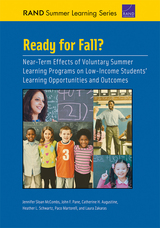


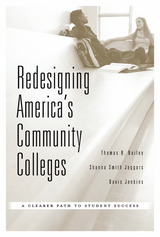
In the United States, 1,200 community colleges enroll over ten million students each year—nearly half of the nation’s undergraduates. Yet fewer than 40 percent of entrants complete an undergraduate degree within six years. This fact has put pressure on community colleges to improve academic outcomes for their students. Redesigning America’s Community Colleges is a concise, evidence-based guide for educational leaders whose institutions typically receive short shrift in academic and policy discussions. It makes a compelling case that two-year colleges can substantially increase their rates of student success, if they are willing to rethink the ways in which they organize programs of study, support services, and instruction.
Community colleges were originally designed to expand college enrollments at low cost, not to maximize completion of high-quality programs of study. The result was a cafeteria-style model in which students pick courses from a bewildering array of choices, with little guidance. The authors urge administrators and faculty to reject this traditional model in favor of “guided pathways”—clearer, more educationally coherent programs of study that simplify students’ choices without limiting their options and that enable them to complete credentials and advance to further education and the labor market more quickly and at less cost.
Distilling a wealth of data amassed from the Community College Research Center (Teachers College, Columbia University), Redesigning America’s Community Colleges offers a fundamental redesign of the way two-year colleges operate, stressing the integration of services and instruction into more clearly structured programs of study that support every student’s goals.
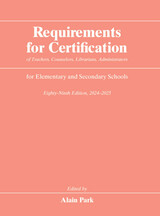
This annual volume offers the most complete and current listings of the requirements for certification of a wide range of educational professionals at the elementary and secondary levels. Requirements for Certification is a valuable resource, making much-needed knowledge available in one straightforward volume.

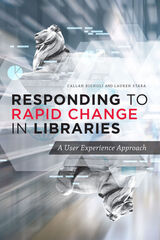
In the face of rapid change and an ever-widening constellation of challenges, it’s crucial for library leaders to pull back to the question of “why?” Plotting a sustainable way forward depends upon recommitting ourselves to our underlying values, such as customer service and community-building, while fostering the improvements that change makes possible. With passion, patience, and fortitude, libraries can stride confidently into the future. In this book, noted speakers and consultants Bignoli and Stara speak directly to library directors, managers, administrators, and technology staff, offering concrete guidance on setting or resetting strategic priorities. Taking an interconnected and specific approach to planning for and strengthening the library environment as a whole, their book
- discusses why libraries should embrace change as a fundamental part of library life;
- explores how to harness rapid change to provide more responsive, user-centered library service;
- addresses the ways in which libraries straddle the physical and the digital, in areas such as service provision and collections, illuminating how they overlap and can be improved using similar philosophies;
- presents both a comprehensive overview of library technologies as well as related team and change management advice, all grounded in user experience principles;
- shows how the concepts of sustainability and flexibility apply to physical space planning and design, from furniture selection and arrangement to infrastructure; and
- provides sound guidance on project management, problem solving, preparing for future challenges, personal reflection and self-care, and other leadership topics.
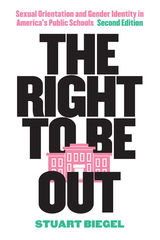
An updated edition of this measured, practical, and timely guide to LGBT rights and issues for educators and school officials
With ongoing battles over transgender rights, bullying cases in the news almost daily, and marriage equality only recently the law of the land, the information in The Right to Be Out could not be more timely or welcome. In an updated second edition that explores the altered legal terrain of LGBT rights for students and educators, Stuart Biegel offers expert guidance on the most challenging concerns in this fraught context.
Taking up the pertinent questions likely to arise regarding curriculum and pedagogy in the classroom, school sports, and transgender issues, Biegel reviews the dramatic legal developments of the past decades, identifies the principles at work, and analyzes the policy considerations that result from these changes. Central to his work is an understanding of the social, political, and personal tensions regarding the nature and extent of the right to be out, which includes both the First Amendment right to express an identity and the Fourteenth Amendment right to be treated equally. Acknowledging that LGBT issues affect people of every sexual orientation and gender identity, Biegel provides a road map of viable strategies for school officials and educators.
The Right to Be Out, informed by the latest research-based findings, advances the proposition that a safe and supportive educational environment, built upon shared values and geared toward a greater appreciation of our pluralistic society, can lead to a better world for everyone.
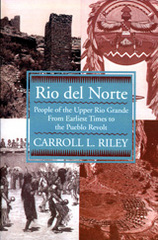
Rio del Norte chronicles the upper Rio Grande region and its divers peoples across twelve thousand years of continuous history. Based on the most up-to-date historical and archaeological research, Rio del Norte is a tour de force, highlighting the unbroken history of the upper Rio Grande.
Beginning with the mammoth hunters of eleven millennia ago, Carroll Riley adeptly eaves the threads of twelve thousand years of continuous history through the introduction of agriculture, the rise of the Basketmaker-Pueblo (Anasazi) people, and the extraordinary "quickening" that occurred along the Rio Grande and its tributaries as the Anasazi era ended.
At that time large towns appeared, some holding several thousand people who practiced irrigation-based agriculture, maintained complex social and political organizations, and had a rich artistry. This "golden age" was continuing when Spaniards contacted, then colonized and missionized the region. In 1680 the Pueblos joined in a powerful record and ousted the invaders. Although the Spanish returned, the Pueblos have maintained important parts of their cultural heritage to the present.
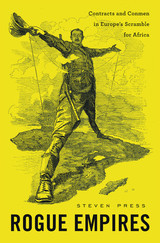
In the 1880s, Europeans descended on Africa and grabbed vast swaths of the continent, using documents, not guns, as their weapon of choice. Rogue Empires follows a paper trail of questionable contracts to discover the confidence men whose actions touched off the Scramble for Africa. Many of them were would-be kings who sought to establish their own autonomous empires across the African continent—often at odds with traditional European governments which competed for control.
From 1882 to 1885, independent European businessmen and firms (many of doubtful legitimacy) produced hundreds of deeds purporting to buy political rights from indigenous African leaders whose understanding of these agreements was usually deemed irrelevant. A system of privately governed empires, some spanning hundreds of thousands of square miles, promptly sprang up in the heart of Africa. Steven Press traces the notion of empire by purchase to an unlikely place: the Southeast Asian island of Borneo, where the English adventurer James Brooke bought his own kingdom in the 1840s. Brooke’s example inspired imitators in Africa, as speculators exploited a loophole in international law in order to assert sovereignty and legal ownership of lands which they then plundered for profit.
The success of these experiments in governance attracted notice in European capitals. Press shows how the whole dubious enterprise came to a head at the Berlin Conference of 1884–1885, when King Leopold of Belgium and the German Chancellor Bismarck embraced rogue empires as legal precedents for new colonial agendas in the Congo, Namibia, and Cameroon.
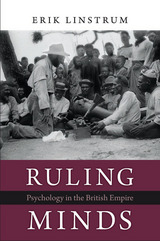
At its zenith in the early twentieth century, the British Empire ruled nearly one-quarter of the world’s inhabitants. As they worked to exercise power in diverse and distant cultures, British authorities relied to a surprising degree on the science of mind. Ruling Minds explores how psychology opened up new possibilities for governing the empire. From the mental testing of workers and soldiers to the use of psychoanalysis in development plans and counterinsurgency strategy, psychology provided tools for measuring and managing the minds of imperial subjects. But it also led to unintended consequences.
Following researchers, missionaries, and officials to the far corners of the globe, Erik Linstrum examines how they used intelligence tests, laboratory studies, and even dream analysis to chart abilities and emotions. Psychology seemed to offer portable and standardized forms of knowledge that could be applied to people everywhere. Yet it also unsettled basic assumptions of imperial rule. Some experiments undercut the racial hierarchies that propped up British dominance. Others failed to realize the orderly transformation of colonized societies that experts promised and officials hoped for. Challenging our assumptions about scientific knowledge and empire, Linstrum shows that psychology did more to expose the limits of imperial authority than to strengthen it.

READERS
Browse our collection.
PUBLISHERS
See BiblioVault's publisher services.
STUDENT SERVICES
Files for college accessibility offices.
UChicago Accessibility Resources
home | accessibility | search | about | contact us
BiblioVault ® 2001 - 2024
The University of Chicago Press









